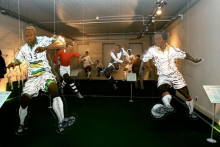Tuning In
Diasporic Contact Zones at the BBC World Service

You are here
- Home
- British Fair Play: Sports Across Diasporas
British Fair Play: Sports Across Diasporas

This project draws upon archive research and interview data and demonstrates how impartiality is played out and configured through the language of national identity and diasporic challenges to the hegemony of Britishness. There is not a simple narrative from Empire but of points of connection and disjunction between different voices of Britishnessness; new diasporic audiences and consistencies of inequality, notably in relation to gender. Sporting power geometries have also been transformed, for example in cricket in the shift to the Indian sub continent (Chapter in Woodward, K. (2009) Embodied Sporting Practices [Basingstoke, Palgrave MacMillan]) David Goldblatt has also presented a series on Cricket for the BBCWS 2009. Kath Woodward was invited to present her work on cricket and to chair the panel on women's cricket at the International Cricket Council Centenary conference in Oxford in 2009.
Research questions
- What have been the most marked transformations in sports coverage on the BBC World Service in recent years?
- Using the example of cricket, how have spatial and diasporic transformations worked in the context of the World Service and BBC sport?
- What has been the impact of technological change on sports broadcasting on the BBC?
- What sort of processes have led to the shift from the 'game of empire' to the Indian Premier League and how has the BBC responded to and been implicated in these processes?
Cricket, as the game played in the Indian sub continent although, 'accidentally invented by the British', offers an excellent example of change that is constituted through technological, economic, financial, political and cultural changes. The stress on change in location and in power geometries underestimates the consistencies and endurances of inequalities in sport, which are manifest in what is broadcast and by whom. Cricket remains powerfully marked by gender inequalities that are sometimes explicit and sometimes the outcome of marginalisation and invisibility.
Project contact:
Prof Kath Woodward, The Open University, k.woodward@open.ac.uk
Kath Woodward is Professor of Sociology and Head of Department at the Open University. She is also a member of the ESRC centre CReSC and works on gendered diasporic identifications and sporting embodied practices. She has contributed to BBC Radio 4, Canadian radio and Sky TV and (as an academic) to the boxing film Twelve Rounds. Her most recent books are, Boxing, Masculinity and Identity (2007), Embodied Sporting Practices (2009) and, with Sophie Woodward, Why Feminism Matters (Palgrave, 2009).
David Goldblatt is a sports writer, broadcaster, and journalist; the author of The Ball is Round: A Global History of Football (Penguin, 2006), and the World Football Yearbook(Dorling Kindersley, 2002), has taught the sociology of sport at the University of Bristol, and has run literacy programmes at football clubs. He has written for most of the quality broadsheets and magazines such as the New Statesman and is currently the sports' columnist for Prospect magazine. He has worked for BBC Radio 4 and the BBC World Service.
Project members:
- Sports Across Diasporas

